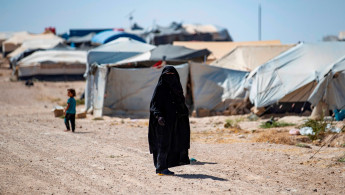Fionnuala Ni Aolain said they were living in "sub-human conditions" in the Al-Hol and Roj camps, being run by Kurdish forces.
"The camps hold over 64,000 people, mostly women and children. Many of them are highly vulnerable. Many of them are experiencing a range of human rights concerns that require states to act expediently," she told reporters in Geneva, via video-link.
Ni Aolain, the special rapporteur on the promotion and protection of human rights while countering terrorism, said her call was backed by a dozen other independent UN experts, who do not speak for the UN, but report their findings to it.
She said she had conveyed her demands in detailed letters to each concerned country, including Australia, Bangladesh, Belgium, Britain, Canada, China, France, Germany, India, Pakistan, Russia, Switzerland, Turkey, and the United States.
"It is the first time that these 57 states have been named together," said Ni Aolain.
"This isn't a club you want to belong to."
Using figures from June 2020, she said that the Al Hol camp holds around 64,000 people, of which more than 80 percent were women and children.
Some 48 percent of those in the camp are Iraqis, 37 percent are Syrians and 15 percent are third-country nationals.
The foreigners are families of jihadists from the Islamic State group, which seized swathes of Iraq and Syria in 2014.
The Iraqi and Syrian residents of the camp largely fled subsequent fighting between IS and Kurdish forces.
"These children and women are living in what can only be described as horrific sub-human conditions. And we offer our concerns that the conditions in these camps may reach the threshold of torture, inhuman and degrading treatment under international law," said Ni Aolain.
The Irish expert said comparisons with Guantanamo Bay, the US detention camp on Cuba, were appropriate.
"This is not a refugee camp. This is a camp in which people are being held without legal process, with no choice, in conditions that are inhumane," she said.
She said the Covid-19 pandemic was no excuse not to repatriate nationals, saying some countries had done so successfully.
Follow us on Facebook, Twitter and Instagram to stay connected





 Follow the Middle East's top stories in English at The New Arab on Google News
Follow the Middle East's top stories in English at The New Arab on Google News


